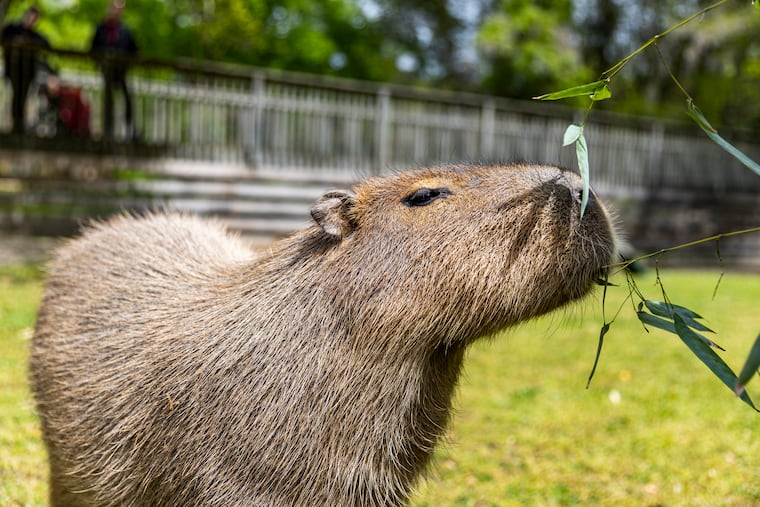Feed the capybaras at the Cape May County Zoo this summer
“They’re like giant potatoes. How do you not love a potato?” Visitors can get up close and personal with the large guinea pig-like creatures, who have gained fame on the internet.

When the baby capybaras at the Cape May County Zoo were born in February 2022, the two siblings were no bigger than good-sized sweet potatoes. Now the 1-year-old sisters, Buttercup and Marigold, are as big as their 8-year-old mother, Budette, and are the stars of the zoo’s capybara encounter and exhibit.
For $400 for a group of four, and $75 for each additional person, capybara enthusiasts can enter the exhibit for a 20 to 30 minute up close visit with the world’s largest rodents. But no, you can’t pet them. Though capybaras have a reputation online for being chill and unbothered, they’re still wild animals, and get skittish when approached by humans.
But you can, accompanied by one of the zoo’s educators, bring bamboo treats to the four capybaras — Buttercup, Marigold, their mom, and their older sister, Capychino. When armed with a sheath of bamboo fronds, the capybaras, making low-pitched chirping noises, will amble right up to guests to demand a snack. You get a chance to admire these creatures up close — imagine a gentle guinea pig the size of a golden retriever, with giant, ratlike front teeth.
“A lot of people come here solely for the capys,” said Bailey Wolf, 23, an educational zookeeper who also leads the zoo’s encounters with camels, sloths, and giraffes. “They’re like giant potatoes. How do you not love a potato?”
Capybaras are semiaquatic, so they spend much of their time sunbathing or relaxing in the enclosure’s pond. Thereabouts, you can also spot red-eared sliders, an invasive New Jersey turtle species that wandered into the exhibit of their own accord. “Turtles really enjoy eating the capy poop,” Wolf explained. A small group of children gathered, cackling, to watch the turtles feast in the pond.
The zoo introduced the encounters during COVID-19, and the capybara one is open seasonally, depending on the weather, from April to October. After that, it gets too cold for the capybaras to be out. Their indoor facility boasts a heated floor and a warm water pool. “It’s like a jacuzzi in there,” Wolf said.
The encounters run once a day, in the mornings, and are booked well in advance. If capybaras aren’t your thing, Wolf recommends the camel encounter, which runs at $240 for four people, and $35 per additional person. Camels sound boring, she said, but the two under their care, Walter and Marty, are rambunctious companions. “They’re like giant dogs,” she said. “They have big personalities.”
Even if you can’t make an encounter, or $400 sounds like too high a price tag for a brief rodent hangout session, you can still visit the capybaras outside their enclosure all summer. The Cape May County Zoo has free admission, and a host of other animals to gawp at, including a new baby wombat and a baby lemur.